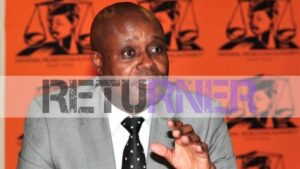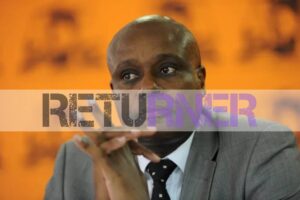
Advocate Andrew Chauke is a well-known South African legal figure who served as the Director of Public Prosecutions (DPP) in South Gauteng from 2011 until his suspension in July 2025. His name has appeared in several high-profile corruption and state capture cases, making him one of the most talked-about prosecutors in the country. While much of his personal life remains private, including his exact age and state of origin, his professional journey and recent controversies have sparked national interest. This article explores key details about his biography, nationality, wife, and the events that shaped his public image.
Also Read: Who is DJ Sumbody? Age, Legacy, Wife, Children, Controversy, And Wikipedia
Andrew Chauke Biography
Andrew Chauke is a South African lawyer and public prosecutor. He became widely known for his role as the Director of Public Prosecutions (DPP) in South Gauteng, Johannesburg. He held this position from 2011 until his suspension in July 2025.
Chauke was born in South Africa, though his exact date of birth and hometown are not publicly confirmed. He studied law and built his career within the National Prosecuting Authority (NPA). Over the years, he gained experience handling criminal cases and legal decisions at the highest level.
He was appointed DPP by the president, giving him authority over major prosecutions in the Johannesburg High Court. His office handled several high-profile cases, including matters linked to corruption and state capture. Some of these cases involved public figures like Brian Hlongwa, Jan Mabula, and Johan Booysen.
Chauke’s work earned him recognition, but also criticism. He faced questions over delays in prosecuting certain cases and decisions made without enough evidence. These concerns led to internal investigations by the NPA. In July 2025, President Cyril Ramaphosa suspended him following recommendations from Justice Minister Ronald Lamola.
Despite the controversies, Chauke played a key role in shaping South Africa’s legal landscape. His career reflects both the challenges and responsibilities of leading public prosecutions in a complex justice system.
Andrew Chauke Early Life and Education
Andrew Chauke was born and raised in South Africa, though specific details about his date of birth and hometown remain undisclosed. His early life was shaped by the socio-political climate of post-apartheid South Africa, which influenced his decision to pursue law. Chauke studied law at a South African university, earning qualifications that allowed him to practice across all levels of the judiciary, including the High Court. His legal education focused on constitutional and criminal law, laying the foundation for his future in public prosecution. Early in his career, he demonstrated a strong grasp of legal principles and a commitment to justice, which helped him rise through the ranks of the National Prosecuting Authority (NPA). His academic background and early exposure to legal practice positioned him as a promising figure in South Africa’s legal system.
Andrew Chauke Career Beginnings
Chauke began his professional journey within the NPA, where he handled cases involving violent crimes and corruption. He was stationed at Innes Chambers in downtown Johannesburg, a building symbolic of the NPA’s efforts to restore its image. His early work earned him a reputation for being assertive and strategic, especially in prosecuting complex criminal matters. Chauke’s ability to navigate politically sensitive cases and maintain courtroom discipline made him a standout among his peers. His involvement in high-stakes prosecutions helped him build credibility within the legal community. Over time, he was entrusted with more responsibilities, including oversight roles and coordination of legal teams. These formative years were crucial in shaping his prosecutorial style—firm, calculated, and often controversial. His rise was not meteoric but steady, marked by consistent performance and growing influence within the NPA.
Andrew Chauke Rise to Director of Public Prosecutions
In 2011, Andrew Chauke was appointed as the Director of Public Prosecutions (DPP) for South Gauteng by then-President Jacob Zuma. This role placed him at the helm of criminal prosecutions in Johannesburg, one of South Africa’s most active legal jurisdictions. As DPP, Chauke oversaw hundreds of cases, including those linked to state capture and high-level corruption. His office was responsible for deciding which cases proceeded to trial in the Johannesburg High Court. Chauke’s leadership style was hands-on, often involving direct coordination with prosecutors and investigators. He worked closely with the Investigating Directorate on cases involving the Passenger Rail Agency of South Africa (Prasa) and other entities implicated in corruption. His appointment was seen as a strategic move, given his experience and familiarity with the legal landscape. However, his tenure also attracted scrutiny, especially as delays and questionable decisions began to surface in high-profile cases.
Also Read: Who is Ozzy Osbourne? Career, Nationality, Wife, Children, Age, Legacy, And Wikipedia
Andrew Chauke Major Cases and Legal Decisions
Chauke’s career is marked by involvement in several controversial and high-profile cases. One of the most debated was the racketeering case against Johan Booysen, former KwaZulu-Natal Hawks boss. Chauke was part of the prosecution team that pursued charges later deemed baseless by the Durban High Court. Another significant case was the corruption investigation involving Brian Hlongwa, former Gauteng Health MEC, which saw a decade-long delay under Chauke’s watch. Additionally, Chauke faced criticism for postponing prosecution against Jan Mabula, a senior police official accused of torture and kidnapping. These cases raised questions about Chauke’s judgment and prosecutorial discretion. While some viewed his decisions as strategic, others saw them as protective of politically connected individuals. His legal choices often sparked public debate and internal reviews within the NPA, highlighting the tension between legal procedure and political influence in South Africa’s justice system.
Andrew Chauke Controversies and Investigations
Andrew Chauke’s tenure has been riddled with controversies, many of which stem from his handling of politically sensitive cases. Allegations include delaying prosecutions, dropping charges without sufficient justification, and failing to act on corruption reports. His role in the Booysen case drew particular attention, with internal NPA investigations questioning the legitimacy of the racketeering charges. Chauke was also criticized for withdrawing charges against Richard Mdluli, former Crime Intelligence boss, despite serious allegations. These decisions led to calls for accountability and transparency within the NPA. The Mokgoro inquiry and the De Kock report both contradicted Chauke’s claims of limited involvement, suggesting he had deeper knowledge of case evidence than he admitted. Public trust in the NPA began to erode, with civil society groups demanding reform. Chauke’s actions became a focal point in discussions about prosecutorial ethics and the need for independent oversight in South Africa’s legal institutions.
Andrew Chauke Suspension and Presidential Inquiry
On July 21, 2025, President Cyril Ramaphosa suspended Andrew Chauke following recommendations from Justice Minister Ronald Lamola and NPA Director Shamila Batohi. The suspension was enacted under Section 14(3) and Section 12(6)(a) of the NPA Act, allowing for an inquiry into Chauke’s fitness to hold office. Ramaphosa cited concerns that Chauke’s continued presence would damage the NPA’s reputation and hinder its operations. The inquiry aims to assess Chauke’s conduct in cases involving state capture, corruption, and prosecutorial delays. The decision followed years of mounting pressure from civil society and political parties, who questioned Chauke’s impartiality and effectiveness. The Presidency emphasized the need for an independent review to resolve disputes of fact and restore public confidence. Chauke, meanwhile, denied wrongdoing and labeled the suspension politically motivated. The inquiry represents a critical moment for judicial reform, signaling a shift toward greater accountability in South Africa’s prosecutorial system.
Andrew Chauke Public and Political Reactions
The suspension of Andrew Chauke triggered widespread reactions across South Africa’s political and civil landscape. ActionSA and the Democratic Alliance (DA) welcomed the move, calling it long overdue and necessary for restoring integrity within the NPA. Civil society organizations, including Open Secrets and the Centre for Development and Enterprise (CDE), praised the decision as a step toward transparency and justice. Legal analysts noted that the suspension could set a precedent for holding senior prosecutors accountable. On social media, reactions were mixed—some applauded Ramaphosa’s decisiveness, while others questioned the timing and motives. Former EFF politician Mbuyiseni Ndlozi publicly supported the suspension, though his comments sparked debate about political bias. The broader public viewed the action as symbolic of a renewed commitment to clean governance. The inquiry into Chauke’s conduct is expected to influence future appointments and prosecutorial standards, making it a pivotal moment in South Africa’s legal history.
Andrew Chauke Legacy and Impact
Andrew Chauke’s legacy is complex, shaped by both notable achievements and deep controversies. As DPP, he played a central role in prosecuting serious crimes and managing high-profile cases. His decisions influenced the trajectory of state capture investigations and shaped public perceptions of the NPA. However, his legacy is also marred by allegations of misconduct, delayed prosecutions, and questionable legal judgments. Critics argue that his tenure reflects systemic issues within the NPA, including political interference and lack of accountability. Supporters maintain that Chauke operated under immense pressure and made difficult choices in a polarized environment. His suspension and the pending inquiry will likely determine how history remembers him—either as a flawed but committed prosecutor or as a symbol of institutional failure. Regardless of the outcome, Chauke’s impact on South Africa’s justice system is undeniable, serving as a case study in the challenges of prosecutorial leadership in a transitional democracy.
What is Andrew Chauke Age and Date of Birth?
As of now, Andrew Chauke Age and exact date of birth are not publicly available.
Also Read: Who is Ewurabena Aubynn? Her Age, Career, Nationality, Wikipedia, And Legacy
Who is Andrew Chauke Wife?
As of now, there is limited verified information publicly available about Andrew Chauke Wife. However, reports indicate that he is married to Pumeza Futshane, who previously served as a chief prosecutor at the Johannesburg Magistrate’s Court. She was suspended from the National Prosecuting Authority (NPA) following allegations of nepotism and misconduct.
Andrew Chauke Wikipedia
- Andrew Chauke is South Africa’s suspended Director of Public Prosecutions for South Gauteng, appointed in 2011.
- He oversaw major corruption cases, including those involving Brian Hlongwa and Johan Booysen.
- Chauke faced criticism for delays in prosecuting high-profile state capture cases.
- He was suspended in July 2025 by President Cyril Ramaphosa pending a fitness inquiry.
- Chauke studied law and built his career within the National Prosecuting Authority (NPA).
- His wife, Pumeza Futshane, was also a prosecutor but faced suspension over misconduct allegations.
- Chauke’s office operated from Innes Chambers in downtown Johannesburg.
- He was involved in the controversial racketeering case against Johan Booysen.
- Civil society groups questioned Chauke’s prosecutorial decisions and transparency.
- His suspension marked a turning point in South Africa’s judicial accountability efforts.
Andrew Chauke Profile Table

| Profile | Information |
|---|---|
| Career | Lawyer, Public Prosecutor, Former Director of Public Prosecutions (South Gauteng) |
| Real Name | Andrew Chauke |
| Age | Not known |
| Date of Birth | Not known |
| Net Worth | Not known |
| Wife | Pumeza Futshane |
| Children | Not known |
| Parents | Not known |
| Religion | Not known |
| State of Origin | Not known |
| Armamata | Not known |
| Education | Studied Law; qualified to practice in South African High Courts |
| Nationality | South African |